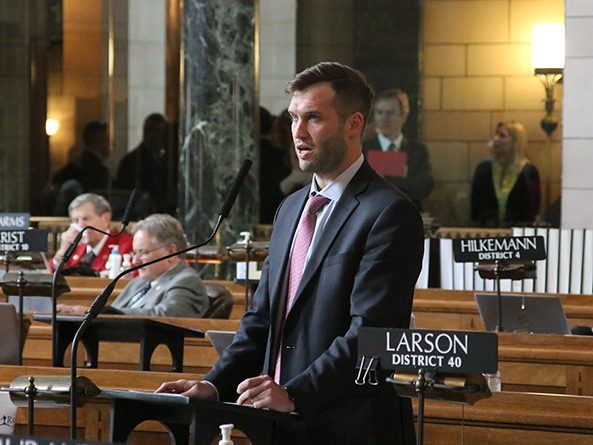Bill would make reservations special economic impact zones
Lawmakers advanced a bill April 5 intended to encourage the formation and expansion of businesses on Native American reservations in the state.
Under LB291, introduced by Sen. Tyson Larson of O’Neill, a qualified business could exclude from its income tax liability any income derived from sources within a special economic impact zone. As introduced, the bill also would have allowed businesses to exclude from sales and use taxes the first $10 million in purchases of goods or services for use within a special economic impact zone each year.
Larson said many businesses avoid locating on reservations in the state because they would be subject to federal, state and tribal income taxes. The proposed state income tax exemption would encourage businesses to locate on reservations by ensuring that they would not be taxed by all three entities.
“My intent with this legislation is an attempt to provide both incentives and benefits within these special economic impact zones in an effort to promote economic growth and stability in these areas,” he said.
Under the bill, a business that engages in Class III gaming activity, derives more than 5 percent of its income from the sale of agricultural grain or relocates from one part of the state to a special economic impact zone would not be eligible for the incentives.
The governing body of any city of the metropolitan, primary or first class would have to approve before trust land located in the city is included in the zone.
Low-income housing projects in a special economic impact zone would receive a bonus under the Nebraska Investment Finance Authority scoring system that allocates federal low-income housing tax credits. As amended, the bill would require that no more than one application per year may be awarded federal low-income housing tax credits as a result of the bonus.
LB291 also would require the state Department of Revenue to enter into a revenue-sharing agreement with an Indian tribe if the agreement includes certain provisions.
Any revenue-sharing agreement must include a requirement that the tribe impose a tribal tax that is less than or equal to state sales and use taxes and a requirement that the tribal tax not be imposed on any transaction that is exempt from state sales and use taxes. An agreement must also include a requirement that the tribal tax be imposed on both members and nonmembers of the tribe, a requirement that 20 percent of the tribal tax be shared with the state and provisions for administering, collecting and enforcing the agreement.
Larson said state sales taxes rarely are collected on reservations because it is considered poor etiquette to ask someone if they are Native American and therefore exempt. The proposed revenue-sharing agreements would help the state and the tribes collect those taxes, he said, because the tribal tax would apply to both natives and non-natives.
This would increase state sales tax revenue while at the same time providing revenue that tribes could use to invest in infrastructure, housing and schools in some of the poorest areas in the state, Larson said.
A Revenue Committee amendment, adopted 26-0, reduced the amount of the proposed sales tax exemption to a business’ first $250,000 in purchases. Larson brought an amendment, adopted 25-0, that would establish as special economic impact zones each reservation in the state and any trust land of an Indian tribe that lies within a federally designated service area.
Senators then voted 26-0 to advance the bill to select file.


